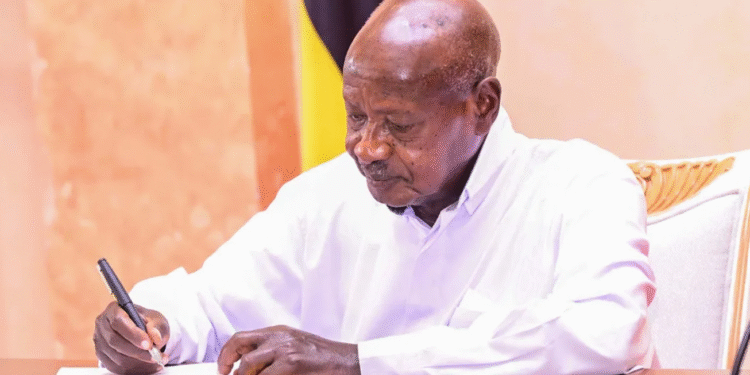President Yoweri Museveni has signed the Uganda Peoples’ Defence Forces (Amendment) Act, 2025, into law, reintroducing provisions that permit civilians to be tried by military courts under broadly defined “exceptional circumstances.”
The announcement was made on Monday, June 16, through the official X (formerly Twitter) account of Uganda’s Parliament, confirming that Museveni had given assent to the legislation. This new law effectively reverses the Supreme Court’s January 31 ruling that declared the military trial of civilians unconstitutional.

The Act, passed by Parliament on May 20, sparked controversy as it was approved amid opposition walkouts and a visible military presence. The law reinstates previously struck-down clauses without clearly defining what qualifies as “exceptional circumstances” for trying civilians in military tribunals.
Opposition legislators walked out of the parliamentary session, criticizing the process as hurried and undemocratic. Despite their objections, 197 MPs from the ruling National Resistance Movement (NRM) unanimously passed the Bill with no amendments.
Following the Bill’s passage, President Museveni praised Parliament, particularly NRM members and what he described as “cooperative opposition,” for averting a major conflict among the military, the legislature, and the judiciary.
“I commend Parliament for passing the UPDF Amendment Bill,” Museveni said. “There was potential for a serious institutional crisis if soldiers accused of crimes like murder, theft, or rape were to be tried in civilian courts instead of by court martial. This would have led to a major clash between the army, Parliament, and the courts. Parliament’s action saved us from that.”
However, legal experts, civil society organizations, and human rights advocates have strongly criticized the law. They argue it undermines constitutional protections for civilians and weakens judicial independence. Many believe it reopens the door to politically driven prosecutions and erodes the authority of the Supreme Court.
Human rights groups have expressed concerns that the Act removes key safeguards for civilians and promotes impunity within security agencies.
Adding to the controversy, Parliament has yet to provide clarification on vague aspects of the law, such as what constitutes military clothing or the legal thresholds under which civilians can now be subjected to military trials.
Despite these objections, the UPDF (Amendment) Act has become law. Its implementation is expected to commence within weeks unless it is rechallenged in the Constitutional Court.

















